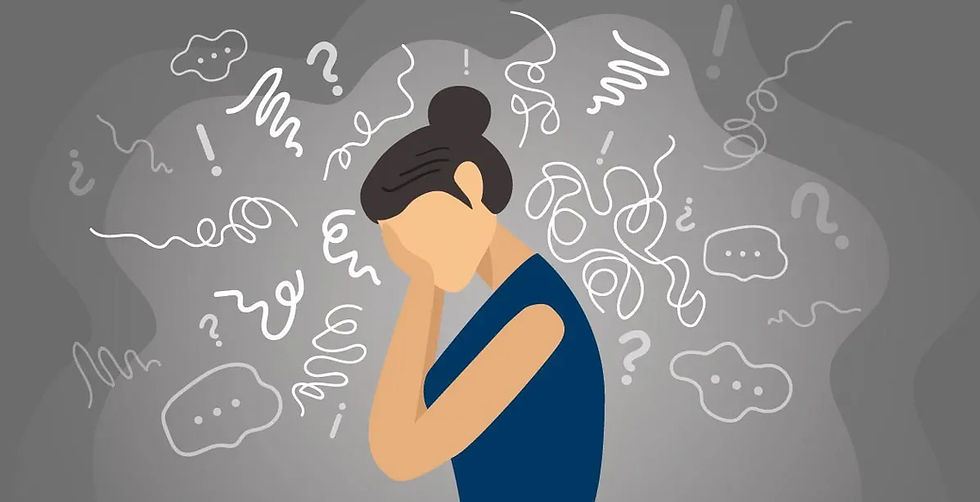Depression vs. Anxiety
- Courtney George
- Mar 21, 2023
- 2 min read
Depression and anxiety are two pervasive mental health disorders that each have their psychological features and could also be experienced simultaneously. The symptoms of these maladies can regularly overlap and sometimes be mistaken for one another. In fact, “About 60% of people with anxiety also have symptoms of depression and vice versa. Each condition can make symptoms of the other get worse or last longer.” On a biological level, depression and anxiety are housed in the amygdala, a region of the brain that regulates emotion, another contributor to their similarities.
Symptoms associated with Depression

Depression tends to involve a (lasting) period of intense feelings of sadness and hopelessness along with experiencing changes in your fundamental daily lifestyle, such as eating, sleeping, energy levels, and concentration. There is a wide spectrum of the severity of these symptoms, but they should always be taken seriously. Depression can lead to a decreased quality of life, further general health problems, and even suicide. Of course, this can be debilitating while going through everyday life, so learning how to manage your symptoms is vital. Common treatment methods for depression include therapy, lifestyle changes/additions, and antidepressants. The chosen method(s) often depend on personalized circumstances and the severity of your depression.

Symptoms associated with Anxiety
On the other hand, anxiety is characterized by excessively consistent feelings of uncontrollable worry and sometimes fear that something may go wrong. Those with anxiety may significantly experience muscle tension, nausea, restlessness, and trembling.
Multiple Forms of Anxiety Symptoms, including PTSD
There are multiple types of anxiety, including generalized anxiety disorder, social anxiety, panic disorder, phobias, obsessive-compulsive disorder, and post-traumatic stress disorder. In regards to treatment for anxiety, some of the methods are similar to treating depression.
How Anxiety and Depression are Interconnected
Both anxiety and depression will likely lead to feeling fatigued, discouraged, and drained. The source of your depression can lead to anxiety (and vice versa). For instance, this interplay can typically be seen when grieving, losing a job, experiencing traumatic events, etc. Although anxiety and depression share attributes, they also have distinguished differences. People experiencing anxiety are usually fearful about the future, while people experiencing depression might have less fraught with fear due to already feeling defeated (and expecting negative feelings/circumstances to continue in the future). In addition, those with anxiety tend to be more skittish with racing thoughts, while those who are depressed may feel duller with primary thoughts of emptiness and worthlessness. Overall, if you’re experiencing symptoms of either one or both of the disorders, it is recommended to get a screening by a mental health professional so they can help you use the best methods to treat your diagnosis. Both disorders can be managed with therapy to help identify triggers, learn coping strategies, and take antidepressants, if necessary. Similarly to depression, anxiety treatment accompanied by frequently practiced habits like exercise, changes in diet, and meditation could help create optimal outcomes. We are here to help. Schedule a free consultation today and share this blog with someone who might find it beneficial.











Comments